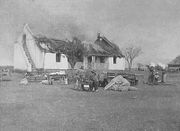The rise of the National Party in South Africa
The story of the National Party (NP) and their ascent to political power in South Africa must start with the Boer War (1899-1902), which was fought between the British Empire and Afrikaner settlers seeking independence from the British. It was a war of attrition, with Lord Milner, commander of the British troops, practicing what he called his ‘scorched earth’ policy, which entailed burning every Boer home they came across to the ground and putting all Boer women and children in concentration camps, in the hopes that this will lessen the resolve of the Boer men. To quote from Encarta: “Some 27,927 Boer civilians, mostly women and children, died as epidemics of measles and typhus raged through these camps during 1901. This was far more than the total number of combatants killed on both sides during the war. Three quarters of these deaths were of children under the age of 16.”
“Some 27,927 Boer civilians, mostly women and children, died as epidemics of measles and typhus raged through these camps during 1901. This was far more than the total number of combatants killed on both sides during the war. Three quarters of these deaths were of children under the age of 16.”
It was this war and these actions that made the Boers hate the British with such lasting passion, and rightly so. The Civilizers showed how often civilization means nothing more than organized barbarism.
Fast forward 37 years to 1939. The United Party (UP), a coalition of English and Afrikaans parties under the leadership of Barry Hertzog and Jan Smuts had won the national elections in 1934. Europe was teetering on the brink of war, and when England finally declared war on Germany for invading Poland, Herzog refused to commit to the war. The majority of the United Party caucus were however of a different mind, and Hertzog was forced to resign. Jan Smuts succeeded him and immediately sided with the British and declared war on Germany
The Afrikaner community was completely alienated by this decision. Why, after all, should they fight for the British, who they were at war with a few decades ago? Particularly against Germany, a people with whom the Afrikaners had always felt a close cultural affiliation towards? Germany had supported the Afrikaners in their quest for nationhood, whilst many Afrikaners still recall the destruction of their families at the hands of the British during the Boer War – an event in living memory.
With conscription legislated, Afrikaner men were forced to fight in the war. Many Afrikaner communities came out in protest, and pro-German organizations like the Ossewabrandwag were established. The UP government responded by placing thousands of Boers in internment camps for the duration of the war, which brought back the painful memories of the Boer War and effectively unified Afrikaners in a common hatred of the British and the UP government.
The centre could not hold, and the Afrikaner elements of the UP broke away from the coalition government and under the leadership of DF Malan re-established the National Party as a fiercely Afrikaner and fiercely nationalist party.
In 1948 the National Party won the elections in a landslide, with the promise that the Afrikaner will never be marginalized again. Ever. Not like they had been by the British in the Boer War, not like they had been by their own government in the Second World War. Not by the dictatorship of the majority. On this promise the NP won every succeeding election until 1994. And it was from this desire for a nation, for a home of their own, that Apartheid was born.

4 comments:
Opressive repressive, intense
laat mens wonder oor forgiveness en als
baie inspereerend in n cane way and all :-)
request:
media and the passive!?
Nooit Zeel,
'n belangrike aspek wat jy uitgelos het is dat die scorched earth beleid eers halfpad deur die oorlog begin is, omdat die Boere die Engelse se vredesvoorwaardes van die hand gewys het. Smuts self was deel van daai onderhandelinge (die presiese naam en plek ontgaan my hierdie oomblik)en het in 'n baie roerende toespraak die ouer generale (hy was 'n skamele 27, Boere generaal en het roem verwerf vir hoe hy en 'n paar honderd ruiters die Kaap ingeval het. Hulle het sover as die weskus gekom voordat Smuts gevang is)oorreed om die voorwaardes te aanvaar. Hulle het nie en het vas geglo hulle kon die oorlog nog wen, maar sou nooit kon voorsien hoe Kitchener hulle so sou kon lamlê nie.
Anyway, die Boere rebellie van 1914 (ek dink dit is die datum) het eintlik 'n groter rol gespeel in Boerehaat teen Smuts, want daar het hy Boere Generale, soos De La Rey, wat saam met hom geveg het gehang vir treason. En dit nadat die tou die eerste keur gebreek het, het Smuts persoonlik per telegraaf laat weet hulle moet weer gehang word.
Moet ook nie vergeet dat die Afrikaners in die Kaap meestal Smutsgesind was, en dat hulle selfs na sy dood probeer vasklou het aan die SAP ideale. Maar die verstedelike en arm Afrikaners aan die Witwatersrand sou altyd so maklik gemanipuleer kon wees deur hul hoogs geleërde leiers, dat hulle nooit die gevorderde argumente van die Sappe kon verstaan nie.
Ag fok man, sorry vir 'n langdradige en onsamehangende comment.
Cheers
Darias
('n groot Smuts aanhanger)
colourfool:-)
You meant to say intellectual.(?)
Oh well. Everyone knows what you meant.
Post a Comment